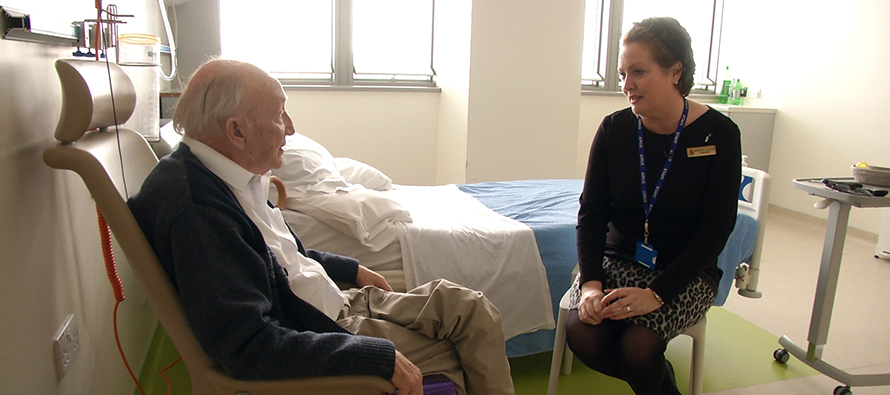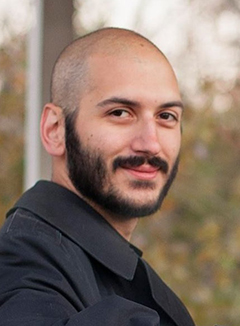Nine reasons chaplaincy training might be right for you

Chaplaincy training includes a great deal of hands-on experience, which can lead to tremendous personal growth. (Photo courtesy of RTÉ.)
For those who feel called to bring spiritual comfort to the ill or imprisoned, I have good news: you can make a world of difference as a chaplain.
Chaplains come from all walks of life, and they can have tremendous impact on those who are hospitalized or in prison. Patients and prisoners frequently suffer from loneliness, grief, and sickness and can be without companionship or prayer to help them through their time of need. You do not need be a counselor or a theologian to be qualified as a chaplain, but rather you can gain the skills and knowledge for chaplaincy ministry through a program known as clinical pastoral education, or CPE.
While it is true that CPE is the first step to becoming a board certified chaplain, the first unit often does not require a Master of Divinity degree. In fact, taking the first unit of CPE is an excellent way to test the waters of a chaplaincy vocation while also growing in your spiritual life and interpersonal skills.
CPE teaches in three main ways: theory, peer growth, and practice. Most programs set aside one day a week to be in class to learn the basics of how to best provide companionship and comfort through pastoral care. In my CPE program I was part of a diverse group of peers who learned the ropes with me. We experienced the same trial-and-error process of pastoral care. We were able to practice being chaplains through supervised work with hospital patients. Most CPE programs are affiliated with hospitals, ensuring hands-on learning.
If you’re concerned that you might not have enough time to explore this vocation, the good news is that many CPE programs have condensed summer programs specifically designed for those who are still in school or just getting ready to enter the workplace. CPE training varies in cost, and some CPE centers do have scholarship programs. Also, in many cases, CPE students continue with the program into a full-time paid position as a resident chaplain.
When I first considered CPE training, I was a little overwhelmed, uncertain if I had what it takes to step into the role of comforter and counselor for the sick. I was the youngest in my program, and oftentimes I’d surprise patients that at age 29 I was already serving as a chaplain. However instead of coming home tired, bitter, or defeated from a hard day, I felt energized, fulfilled, and whole because I was learning and, if nothing else, representing God’s presence among those who were sick.
God led me by the hand every day as I explored this ministry—one I had never previously imagined for myself. Within just five months of the first unit of CPE, I found myself growing immensely. I encourage others to explore the possibility of taking at least the first unit of CPE. To find about CPE programs in your region, visit acpe.edu.
Here are nine reasons you may want to try chaplaincy training.
1. Grow out of your comfort zone.
Nobody likes being in the hospital or in prison. But perhaps that natural aversion is an indicator of how Christ can stretch us and carry our cross. Whether it’s apprehension over germs or blood, or discomfort with stuffy rooms and the strangers that occupy them, becoming a hospital chaplain stretches you to be bold in entering a space that few voluntarily choose to enter. Even if you never become a chaplain, weeks of visiting patients will make you more comfortable when visiting family or friends in the hospital.
2. Step out of your bubble.
I studied in a seminary and worked in a parish before I enrolled in a CPE program. Back then I didn’t have to stretch myself by conversing with those of different beliefs or values. My interaction was with those of the same faith and foundation as myself. As a chaplain, however, I serve everyone, blessing me with incredible conversations with those who think very differently. My role as a chaplain is not to change anyone’s mind, but instead to enter into the patients’ world, see where that person is, and bring peace and companionship into that reality.
3. Develop your interpersonal skills.
Listening to others and resolving conflict might seem like simple skills that come with experience, but I’ve learned there is a science to both. The active listening taught in both CPE classes and the hospital can enhance conversations you have with your own friends and family, helping you to civilly express your feelings or discomfort when conflict arises in your relationships.
4. Reflect on yourself.
CPE has taught me to put on my own spiritual oxygen mask first before assisting others. The better I understand myself—my personality, past, and growing edges—the better I can help others understand themselves. Most CPE programs help students explore and open up about their family and upbringing. Peers even evaluate and encourage one another on interpersonal skills throughout the course, often sharing what they see as talents and areas for growth.
5. Appreciate life.
CPE courses encourage students not to pity those in bad circumstances so much as to empathize. Pity implies condescension or looking down on others—but when you learn of the hardships of those in the hospital you can’t help but be grateful for your own time on Earth. Life can be short and riddled with tragedy, and spending time in a hospital can help you come to terms with that truth.
6. Meet incredible individuals.
As a chaplain you become a historian of sorts, carrying with you hundreds of unique life-stories that are simply remarkable. After I learned to muster up the courage to speak to dozens of strangers each day, I became more apt and curious to ask strangers on planes where they are from and where they are going.
7. Experience an interdisciplinary vocation.
Many of the men and women who work in hospitals are truly amazing, and as a chaplain you will have the privilege of working closely with them. Knowing that you are working alongside physicians and nurses to collaborate in the holistic healing of an individual is an incredible feeling. As you work toward the spiritual health of your patients, you in turn become a resource for that same spiritual healing within the healthcare team so that they can continue to save more lives. The work of a chaplain compounds healing.
8. Invigorate your prayer life.
Let’s face it: it’s easy to forget to pray with all the busyness and distractions of life. Even when we remember to pray, sometimes it’s hard to remember who most needs our prayers. Hearing patients throughout the day ask me to pray for them personally reinvigorated my prayer life by reminding me of the needs around the world that require supplication. In addition, when I’ve been at a loss for words to offer a patient who is going through something truly awful, it reminds me that I don’t have to assume control and fix anything. It reminds me to humble myself before the Lord and give everything up to him.
9. Meet Christ.
“When I was sick and in prison, you did not visit me.” I used to feel personally stung by Christ’s admonition of those who do not serve their neighbor in the hospital and prison. While I had done my part in giving to the poor and feeding and clothing them, visiting strangers was uncomfortable for me. Little did I know that Christ was not simply telling us what he expects, but that he is waiting for us in hospitals and prisons! Even the most faithful Christian can lose sight of where exactly Jesus is in his or her own life. It gives me comfort knowing that Christ stands at each hospital bed, waiting for me to meet him there, and remains there even when I leave the patient.
Tags
Related
- Explore the different types of vocations
- How to prepare for consecrated life
- Holiness is for everybody
- The essential facts about secular institutes
- Obstacles and options for older discerners
Most Viewed
- Find your spirituality type quiz
- FAQs: Frequently asked questions about vocations
- Celibacy quiz: Can you live a celibate life?
- Resources for older discerners or those with physical and developmental differences
- About Vocation Network and VISION Guide


